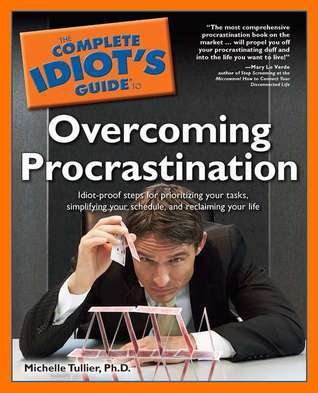Comprehensive and well-written, this book was still published in 1999. This does put it at odds with a lot of more current advice, but it still rings pretty true.
The book is split into five main parts:
Part One: The Whats, Whys and Woes of Procrastination
Part Two: Becoming an ex-Procrastinator
Part Three: Tips and Tricks for Getting Things Done
Part Four:Getting Things Done At Work and School
Part Five: Living the Life of an ex-Procrastinator
Now I thought that I was somewhat bad with putting things off, since that was the main reason I did badly in College. I put off my homework and the whole thing snowballed into doing badly on exams and quizzes and things. The people in this book are on a whole different level. They put off essential repairs of their homes, they never pay bills on time, they put off doing essential work tasks and so on.
Part one contains a detailed account of what procrastination is, how it manifests itself, where it manifests itself, and a basic overview on time management.
Part two tells you that since Procrastination is a habit, it is difficult to have a magic bullet or panacea for it. Thus, part two also tells you that you might need professional help. No, not necessarily from a "Shrink" to give the pejorative term, but possibly from a Career Coach, a Professional Organizer, or yes, even a Psychiatrist or other type of Mental Health Professional. Part two also tells you how to get rid of clutter and other acts of organizing, and how to make decisions more effectively.
Part three contains advice on household tasks and chores and ways to set up systems to tackle them. So you have dishes right? This book gives advice on how to bring yourself to do the dishes. Don't think that this section is only limited to dishes and taking out the trash though. It also talks about deciding whether or not to get married, childproofing, getting a social life, New Year's Resolutions, taxes and budgeting, and writing correspondence to people in a timely manner.
Part four focuses on career changes and school. If I had been reading this around ten years ago, this area is where I would have needed the most assistance.
Part five talks about what to do after you have presumably conquered procrastination from your life. (Hint, don't proselytize.)
So all in all, it is pretty interesting and contains good advice, but it wasn't super amazing and life changing for me. Moreover, it mentions the idea of multitasking as a good idea. Sure it is mentioned in a "Quicksand" portion, basically one that tries to prevent you from doing something. Let me paraphrase it as best I can: multitasking might seem like a good way to spend your time, but your focus is split and the job you do isn't as good as if you only did one thing at a time.

